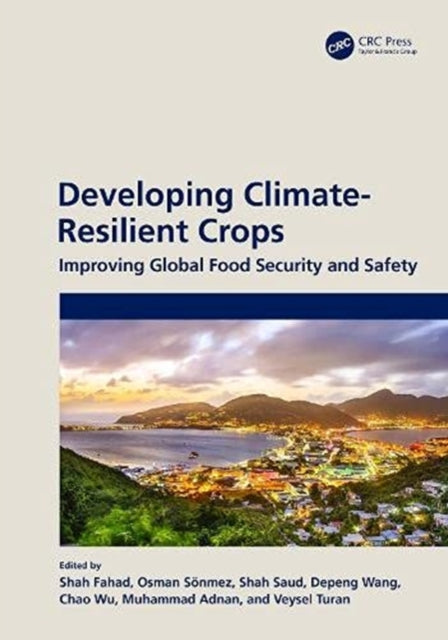Shulph Ink
Developing Climate-Resilient Crops: Improving Global Food Security and Safety
Developing Climate-Resilient Crops: Improving Global Food Security and Safety
YOU SAVE £7.20
- Condition: Brand new
- UK Delivery times: Usually arrives within 2 - 3 working days
- UK Shipping: Fee starts at £2.39. Subject to product weight & dimension
Bulk ordering. Want 15 or more copies? Get a personalised quote and bigger discounts. Learn more about bulk orders.
Couldn't load pickup availability
- More about Developing Climate-Resilient Crops: Improving Global Food Security and Safety
The paper addresses the limits of the anthropogenic global warming theory and presents the main characters necessary for climate resilient agriculture. It provides valuable resource for students engaged in environmental sciences, soil sciences, agricultural microbiology, plant pathology, and agronomy.
\n Format: Hardback
\n Length: 234 pages
\n Publication date: 05 August 2021
\n Publisher: Taylor & Francis Ltd
\n
The Intergovernmental Panel on Climate Change (IPCC) advocates for the anthropogenic global warming theory, which suggests that human activities are the primary driver of climate change. However, there are limitations to this theory that need to be addressed. In this essay, we will explore these limitations and discuss the main characters necessary for climate resilient agriculture.
Climate resilient agriculture refers to the ability of agricultural systems to adapt to changing climate conditions and maintain or improve productivity. It involves a combination of drought tolerance, heat tolerance, water use efficiency, disease resistance, nitrogen use efficiency, nitrogen fixation, and carbon sequestration. These characters are essential for ensuring the sustainability of food production in the face of climate change.
Theoretical Aspects:
Drought Tolerance: Drought is one of the most significant challenges facing agriculture in the context of climate change. It is characterized by a lack of rainfall or water availability, which can lead to crop failure and reduced productivity. Climate resilient agriculture requires the development of crop varieties that can withstand drought conditions and maintain their yield.
Heat Tolerance: Heat stress is another challenge that agriculture faces due to climate change. It is caused by high temperatures, which can damage crops and reduce productivity. Climate resilient agriculture requires the development of crop varieties that can withstand high temperatures and maintain their yield.
Water Use Efficiency: Water is a critical resource for agriculture, and climate change is leading to increased water scarcity. Climate resilient agriculture requires the development of crop varieties that require less water to grow and maintain their yield.
Disease Resistance: Climate change is also leading to the emergence of new diseases that can damage crops. Climate resilient agriculture requires the development of crop varieties that are resistant to these diseases.
Nitrogen Use Efficiency: Nitrogen is a critical nutrient for crop growth, and climate change is leading to increased nitrogen pollution. Climate resilient agriculture requires the development of crop varieties that are efficient in nitrogen use and reduce the environmental impact of nitrogen pollution.
Nitrogen Fixation: Nitrogen fixation is the process by which bacteria convert nitrogen gas into ammonium, which is then used by plants to grow. Climate resilient agriculture requires the development of crop varieties that are capable of nitrogen fixation and reduce the reliance on synthetic fertilizers.
Carbon Sequestration: Carbon sequestration is the process by which plants absorb carbon dioxide from the atmosphere and store it in their tissues. Climate resilient agriculture requires the development of crop varieties that are capable of carbon sequestration and reduce the amount of carbon dioxide in the atmosphere.
Practical Aspects:
Climate resilient agriculture requires a combination of theoretical knowledge and practical skills. Farmers need to be aware of the climate conditions in their region and select crop varieties that are suitable for those conditions. They also need to implement practices that improve soil health, reduce water use, and manage pests and diseases.
Factors Threatening Future Food Production:
Climate change is not the only factor that threatens future food production. Other factors, such as land degradation, soil erosion, and population growth, also play a significant role. Land degradation is caused by the overuse of land, which can lead to soil erosion and reduced soil fertility. Soil erosion is caused by the removal of topsoil by wind or water, which can lead to reduced crop yields and increased soil loss. Population growth is caused by the increase in the global population, which can lead to increased demand for food and reduced availability of land.
Conclusion:
The anthropogenic global warming theory has limitations that need to be addressed. Climate resilient agriculture is essential for ensuring the sustainability of food production in the face of climate change. It involves a combination of drought tolerance, heat tolerance, water use efficiency, disease resistance, nitrogen use efficiency, nitrogen fixation, and carbon sequestration. Farmers need to be aware of the climate conditions in their region and select crop varieties that are suitable for those conditions. They also need to implement practices that improve soil health, reduce water use, and manage pests and diseases. Climate change is not the only factor that threatens future food production, but climate resilient agriculture can help to mitigate these threats.
\n Weight: 702g\n
Dimension: 182 x 262 x 21 (mm)\n
ISBN-13: 9780367623470\n \n
This item can be found in:
UK and International shipping information
UK and International shipping information
UK Delivery and returns information:
- Delivery within 2 - 3 days when ordering in the UK.
- Shipping fee for UK customers from £2.39. Fully tracked shipping service available.
- Returns policy: Return within 30 days of receipt for full refund.
International deliveries:
Shulph Ink now ships to Australia, Belgium, Canada, France, Germany, Ireland, Italy, India, Luxembourg Saudi Arabia, Singapore, Spain, Netherlands, New Zealand, United Arab Emirates, United States of America.
- Delivery times: within 5 - 10 days for international orders.
- Shipping fee: charges vary for overseas orders. Only tracked services are available for most international orders. Some countries have untracked shipping options.
- Customs charges: If ordering to addresses outside the United Kingdom, you may or may not incur additional customs and duties fees during local delivery.


